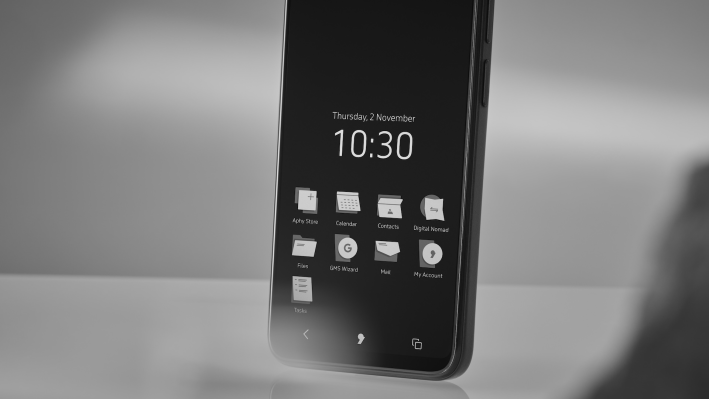Punkt first made a name for itself in the world of mobile with pared-down, monochromatic phones focused on voice, text and not much else. Now, the Swiss company has taken its concept of minimalism and changed it up, with the launch of its first smartphone — a device that positions itself at the crossroads of utility, privacy and minimalism.
If you’re reading this, chances are you own either an iPhone or Android device, depending on your personal preferences and economic disposition. The Apple and Google mobile duopoly has been met with some challengers through the years, including that time when Microsoft threw its might behind Nokia in an effort to propagate Windows Phone — and let’s not forget Amazon’s ill-fated Fire Phone foray.
Sandwiched in between these efforts has been a slew of basic phones that promise to help people untether from the connected world. HMD Global has had a run of Nokia-branded phones; and there has been a swathe of newer players too, such as New York-based Light Phone — and Punkt which brought its last phone to market back in 2018 in the form of the MP02.
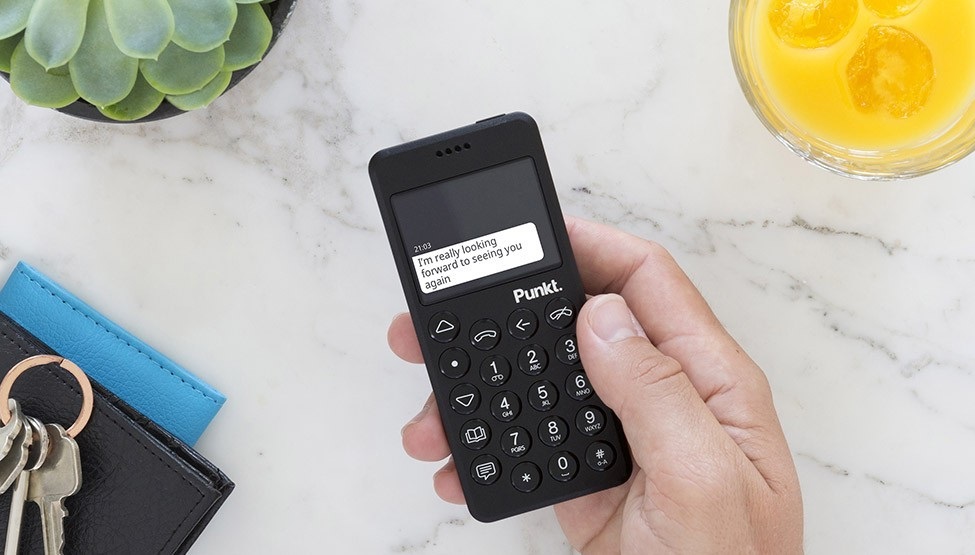
Minimalist Punkt MP02 mobile phone (2018). Image Credits: Punkt
There might be a market for these so-called “dumb phones,” but building a sustainable business off the back of them isn’t easy. It’s difficult to function in society without a smartphone, and for every person who yearns to minimize screen time or maximize data privacy, there are billions more who use (and expect) instant messaging, navigation, entertainment, one-tap taxis and social media.
This brings us to the MC02, Punkt’s first foray into the world of smartphones. The device ships with a unique version of Android, replete with easy data privacy controls, a built-in VPN that works at the chipset level and a handful of services bundled under a monthly subscription designed to make this a sustainable operation: recurring revenue is the game-plan here.
After an extended period on preorder at $749 (USD) / €699 (EUR) / £599 (GBP), the MC02 is now shipping to customers around the world. TechCrunch spent a little hands-on time with it and caught up with Petter Neby, founder & CEO of Punkt, to ask: why a smartphone, and why now?
Look and feel
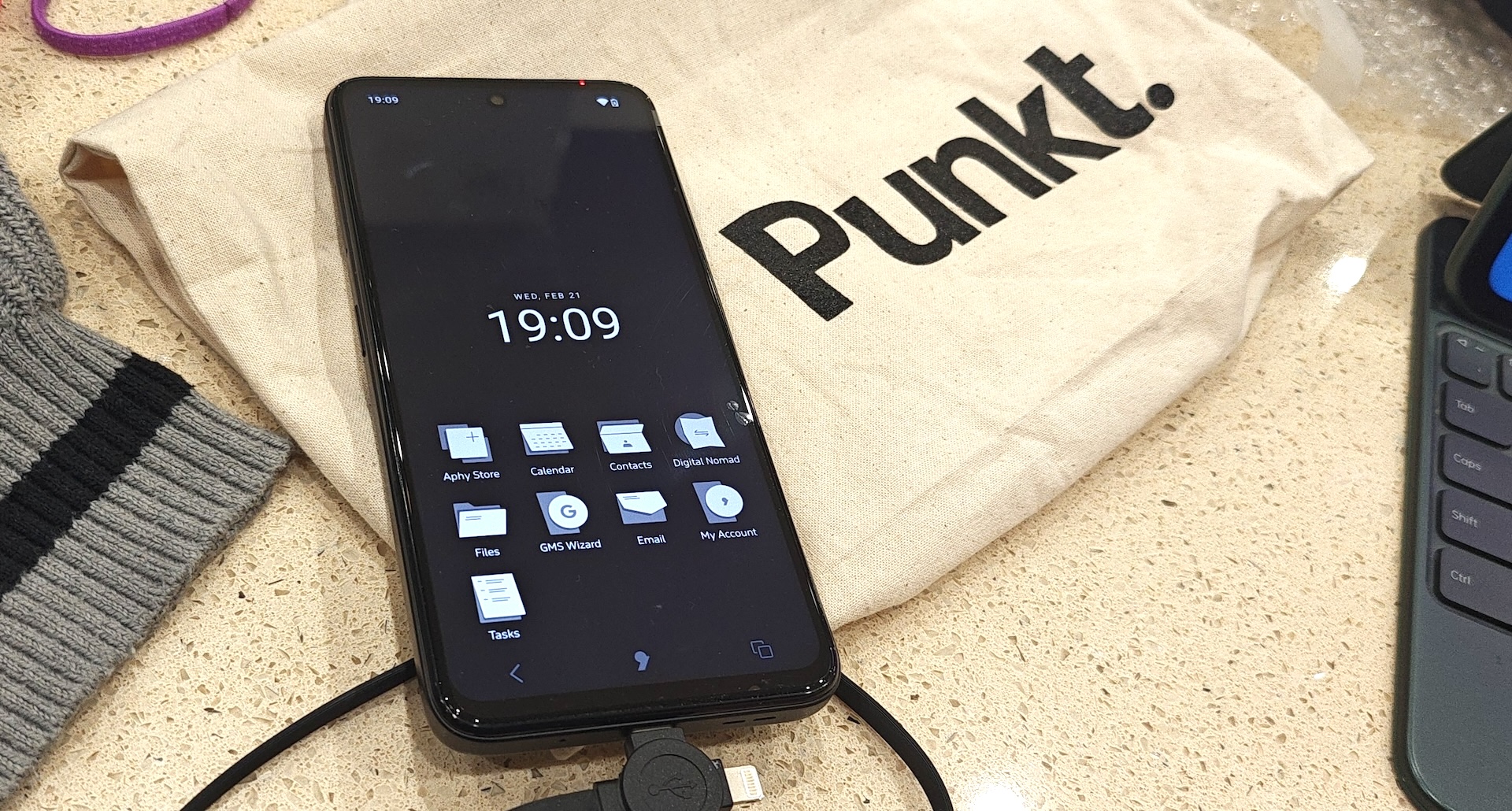
Punkt MC02. Image Credits: Paul Sawers / TechCrunch
The MC02, specifications-wise, is a far cry from Punkt’s earlier devices, but it’s also far from cutting-edge. It has a 6.7-inch HD screen, 6GB of RAM, 128GB of storage (expandable), a 64MP rear camera, a 24MP selfie camera, dual SIM trays, a 5,500 mAh battery and a 3.5mm headphone jack. It also has many of the other features you would expect from a modern smartphone, such as NFC, fingerprint unlocking, wireless charging (18W) and fast-charging that promises up to a 50% charge in around 40 minutes.
However, the MC02 isn’t really about all that — in Punkt’s own words, it isn’t “in a tech spec race.” The company instead wants to focus on the nuts and bolts of the operating system, something that Neby acknowledges with reference to the lack of “personality” many devices — including his own — have.
“If you think about the [MC02] smartphone from a hardware perspective, it’s a mid-range phone, a glass slab that looks like everything else, except there’s a logo at the bottom that says ‘Punkt’ — everything else is the same,” Neby told TechCrunch. “It’s software that makes the difference. But there’s a passionate side of me that really likes objects, and I like them to have personality — there is zero personality here.”
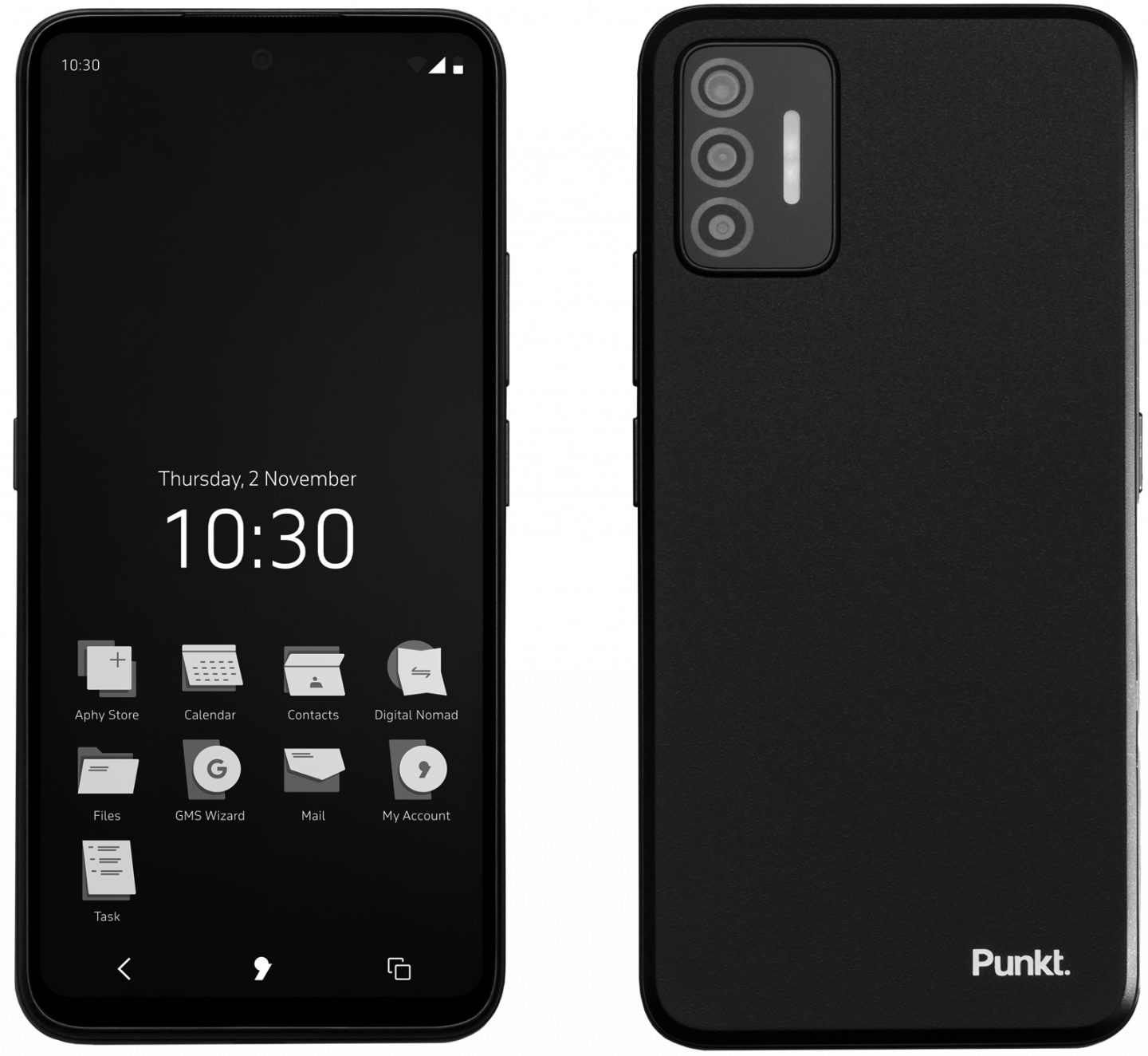
Punkt MC02 smartphone. Image Credits: Punkt
The phone ships with a flavor of Android (the Android open source project, that is) called Apostrophy OS, which itself is forked from the GrapheneOS mobile operating system, which is designed as an independent, Google-free alternative for Google’s Pixel smartphones.
It’s worth noting here that Apostrophy is in fact a standalone company, also created out of Switzerland by Neby. A version of the operating system debuted on the previous Punkt mobile phone. The near-term plan is to “sell” Apostrophy OS to other handset makers who can monetize their devices through subscriptions rather than data-harvesting — and that is why it was set up as a separate company with its own funding mechanisms.
Indeed, while Punkt itself has been entirely bootstrapped by Neby since its inception in 2008 when it built an alarm clock and cordless home telephone, Apostrophy has taken on outside investment.
“It’s too big for Punkt to handle — we need different skillsets and capabilities and independence to make [Apostrophy] work,” Neby explained. “And I think that if Apostrophy will in five years be selling 5 million handsets with different brands on them, this will be much better because I don’t think Punkt will ever get to those kinds of numbers. Because Punkt’s business is a different thing.”
Scaling is the name of the game, with Punkt serving as the first Apostrophy customer — though Neby said they are preparing to get other phonemakers on board too, one of which has already signed up.
“From a personal point of view, I think it’s important that if you like Oppo or OnePlus or whatever, you should be able to have an Apostrophy on that — because that is a real choice, that’s a modern choice,” Neby continued. “So the plan for Apostrophy is by next year, we will have launched at least one more brand and onboarded another, and within five years we should have at least nine SKUs [distinct mobile phone products] across various brands.”
However, the company is coy when it comes to who’s bankrolling Apostrophy, merely stating that it is backed by “individuals and organizations who value data privacy and security at their core,” with an NDA agreement in place to keep the names under wraps for now.
Privacy-as-a-Service
In terms of business model, Apostrophy sells subscriptions. Those who buy the MC02 get a year for free, after which they’ll pay around $20/€15/£13 each month (discounted if paid annually) to access a handful of services, including email, a VPN (dubbed “Digital Nomad”), online synchronization for calendar and contacts, secure storage on Punkt’s own Swiss servers and the express promise that there will be no ads or third-party crawlers.
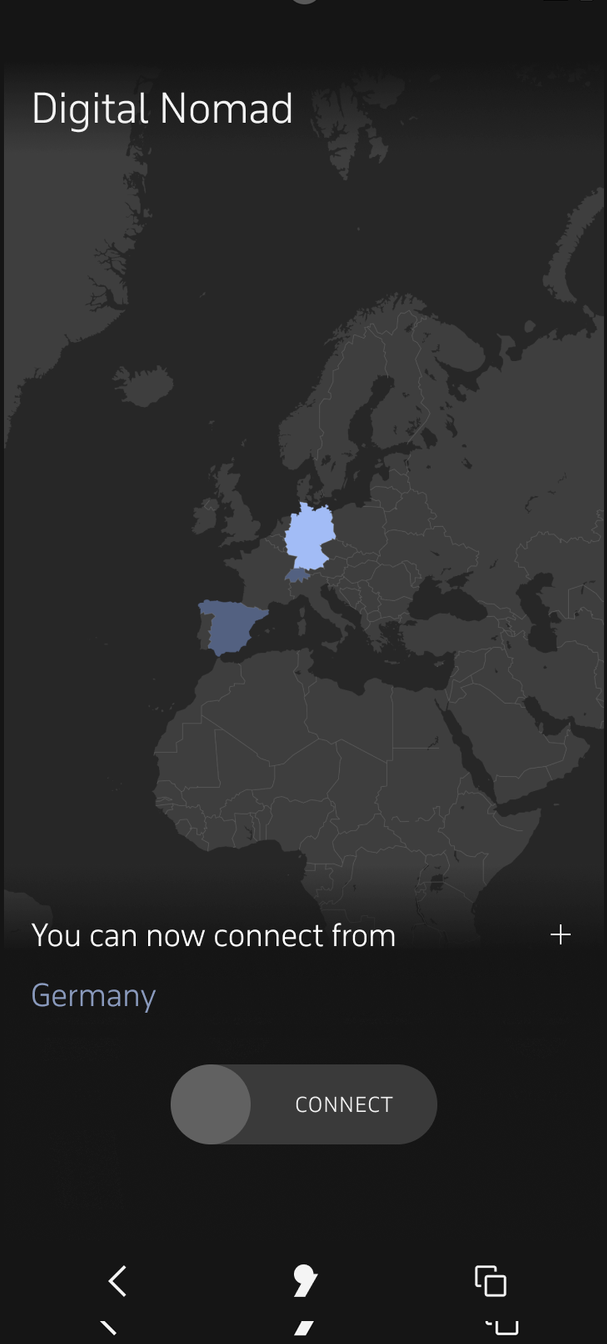
Punkt “Digital Nomad.” Image Credits: Apostrophy
The device works just fine without a subscription or even an Apostrophy account, you just won’t be able to access the aforementioned services. Thus, Punkt is pegging its plans on a portion of the population that has tired of Big Tech’s reach into every crevice of our everyday life, including Google’s nefarious data-hoovering efforts which have become a staple part of the Android experience through the years, shoehorning its own sticky applications into the fabric of the operating system.
“They have managed to eat the whole Android open source world by incorporating more and more services from Google,” Neby said.
But there is no denying that consumers like free things, and that is what Google has done a stellar job of leveraging — making its platform as sticky as possible by “giving away” cool software, and in return it gets to operate a massive ecosystem of products and services built around data.
Thus, it remains to be seen whether enough people would be willing to pay $20/month to access products they can access for free elsewhere — even if it does come with the promise of more privacy.
“You have to pay, because if you’re not paying for owning and controlling your data, then you have to pay with your data,” Neby said.
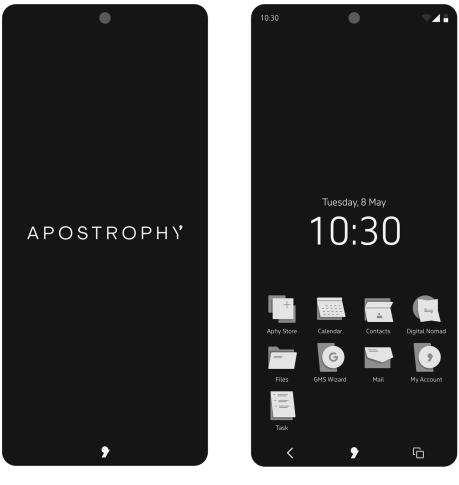
Apostrophy OS. Image Credits: Apostrophy
Apostrophy is pitched as “private by default,” and it features many of the similar “stock” apps that ship with GrapheneOS, including the Chromium-based Vanadium browser.
The MC02 also acknowledges that people want to install apps, which is why it allows the user to access the Google Play store via the built-in GMS (Google Mobile Services) Wizard, using their standard Google credentials.
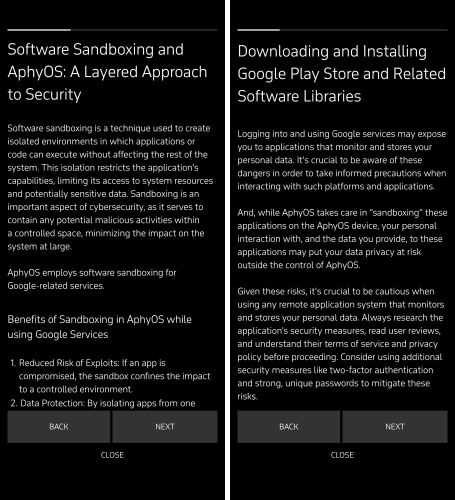
Punkt MC02 and Apostrophy: Sandboxing. Image Credits: Paul Sawers / TechCrunch
The Android apps are walled into a separate sandboxed environment, where the data remains between the user and the app developer, limiting the app’s ability to access other system resources and data such as contacts, files or emails.
Once installed, users can swipe left on the main homescreen to access this sandboxed environment, which lets them interact with apps they’ve installed in pretty much the same way as you would on a standard issue smartphone, including all the usual push notifications and alerts to tell you that you’ve received a message.
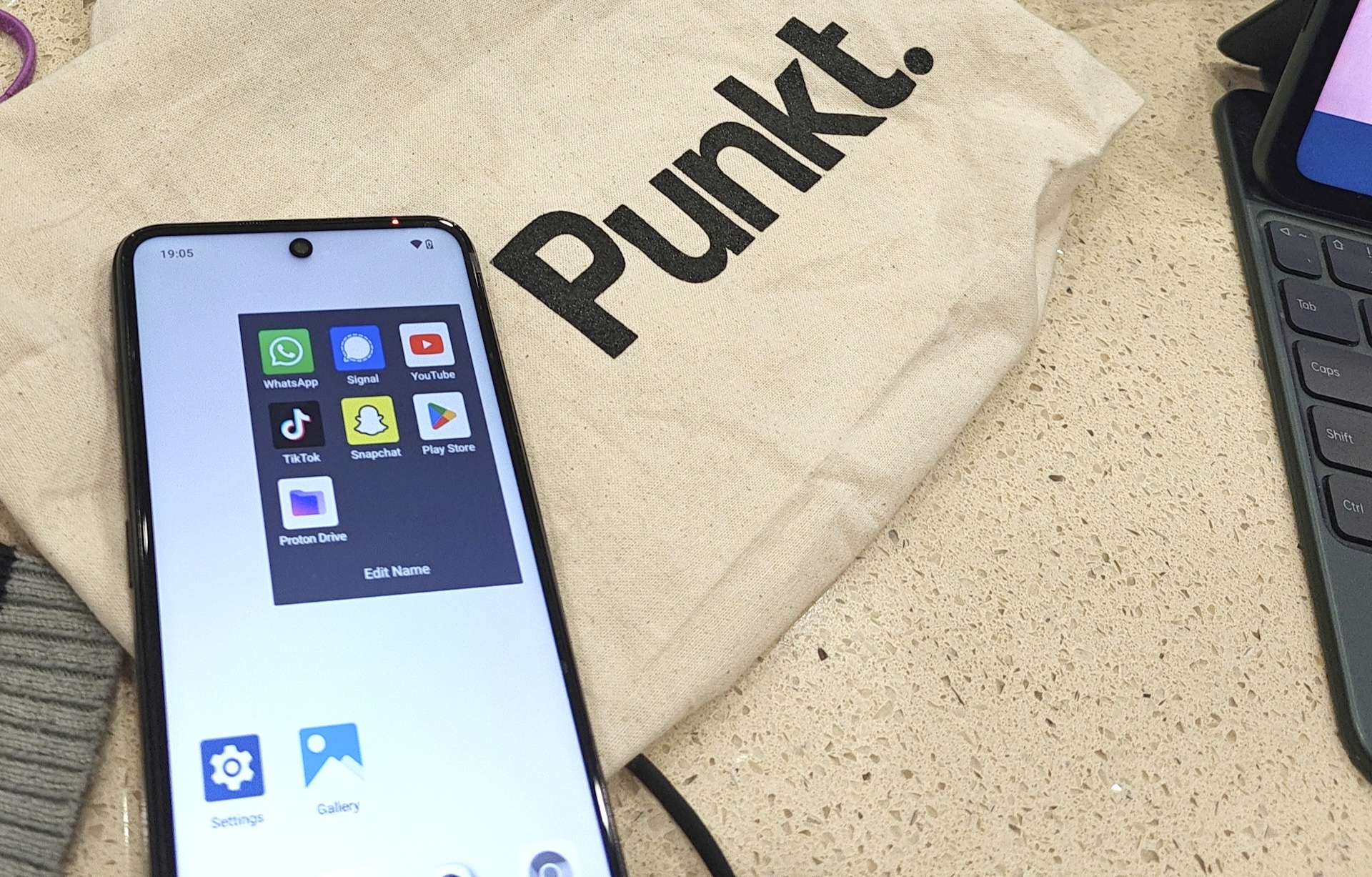
Punkt MC02 replete with naughty data-harvesting apps. Image Credits: TechCrunch / Paul Sawers
You can also long-press on any app to access the “carbon and data ledger,” which takes you to these little dials for tweaking app permissions and battery usage — it’s basically a more user-friendly way of altering the privacy controls of each app (rather than going through settings), while also factoring in the environmental impact that background processes have in terms of battery consumption.
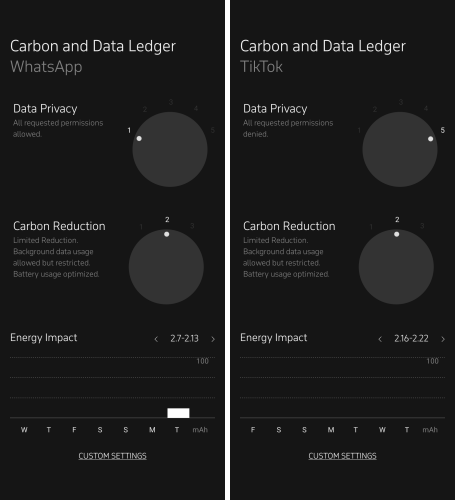
Punkt MC02: Data privacy and carbon reduction ledger. Image Credits: TechCrunch / Paul Sawers
In terms of overall goals, there are some similarities to what European rival Murena is trying to do with a LineageOS fork called e/OS. But one major differentiator is that Punkt is manufacturing its own phones, which technically gives it greater control over how the software plays ball with the hardware at a chipset level.
However, Punkt’s devices are still made in China (as you might’ve guessed) with its manufacturing partner Fxtec, a company better known for a quirky Android device with sliding QWERTY keyboard.
“It’s absolutely 100% Chinese, but when the phone is flashed [a process for installing software and firmware], that channel is controlled by us,” Neby said. “So no one there can flash the handsets at the end of a conveyor belt.”
A third option
It may have been inevitable that Punkt would segue down the smartphone route. And likewise, it was inevitable that MC02’s announcement would cause some consternation, with its fervent minimalist phone fanbase awash with comments such as “we lost Punkt.”
Neby is quick to stress that it hasn’t abandoned its minimalist roots, and will still develop more pared-down phones in the future à la the MP02. Plus, he maintains that the MC02 still has one foot in the minimalist camp due to the device’s default settings and the way it presents information, including the different homescreens replete with an uneditable default view containing basic “stock” apps such as calendar, contacts and VPN.
“I would say this is a natural evolution of minimalism,” Neby said.
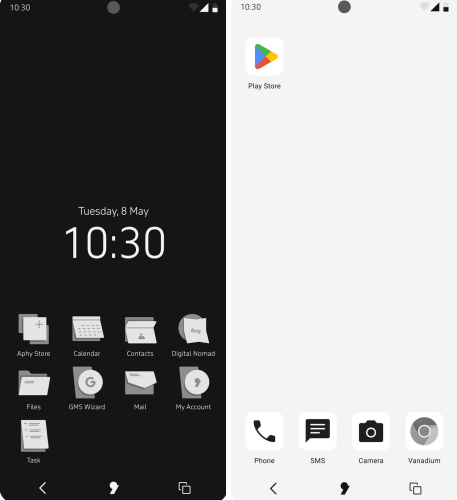
Punkt MC02 and Apostrophy: Two-screens. Image Credits: Apostrophy
However, while Punkt pitches the MC02 as a “5G ‘secure’ phone,” this isn’t exactly the Fort Knox of smartphones. There is often conflation between “private” and “secure,” and while the MC02 can certainly lay claim to some semblance of being privacy-oriented, there isn’t much going on here as it pertains to real “security” — certainly, not in the sense of military-grade hardening.
Indeed, the “secure” in its tagline is actually more about pleasing the SEO Gods than anything else — the company confirmed as much, noting that people tend to conflate the words “secure” and “privacy” when searching for products online.
So this isn’t for government officials that might be subject to targeted attacks from foreign entities. This is a consumer device for those seeking a middle-ground between a device that perennially pings data to God knows where, and one that offers not much more than SMS and phone calls.
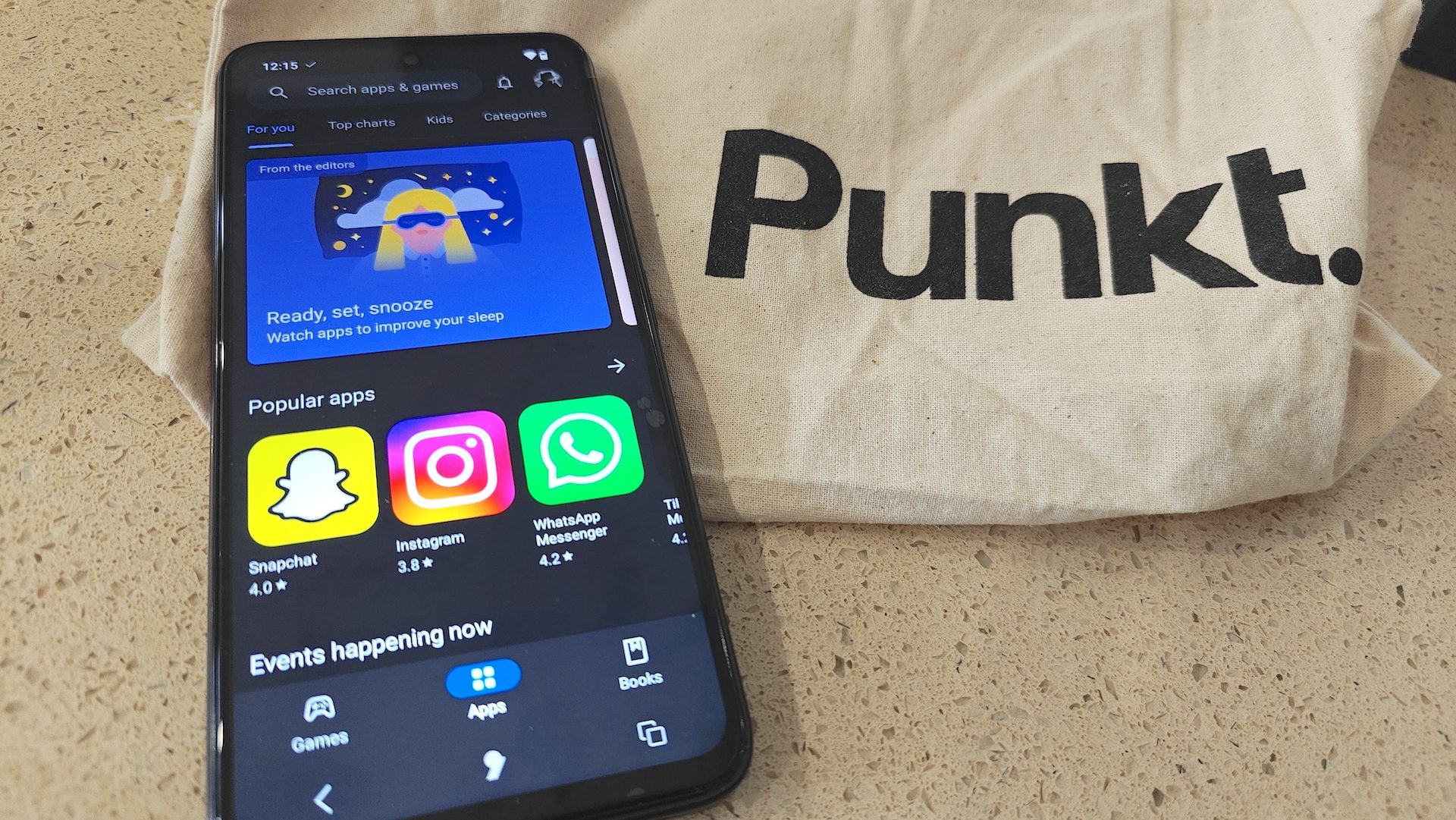
Punkt MC02. Image Credits: TechCrunch / Paul Sawers
Resurgence
There are some signs that basic “feature” phones are having a minor resurgence, particularly among a Gen Z / millennial demographic looking to switch off from social media through “digital detoxing.” The New York Times ran a report last year looking at the Brooklyn-based “Luddite Club” involving teenagers pushing back against smartphones. And Counterpoint data indicates that just a little more than 2% of handset sales in the U.S. are feature phones, translating to an estimated 2.8 million sales last year — not a huge number, for sure, but Counterpoint said that figure had slipped to below 1% in 2021. So this might not be the comeback that some headlines claimed, but there is some evidence that at least some people want an alternative to the established smartphone incumbents.
And this is where the MC02 might find some fans — it’s another option for those that want to reduce the presence of Apple and Google in their digital lives.
“When you’ve got a choice of two, that’s insane,” Neby said. “From my personal perspective, it’s all about education — wake up, understand where you are and take a conscious decision of what you’re doing. And then you become a much more educated consumer of technology. I’m sure that the younger generation is going there, some are already there. But they don’t actually have a choice.”
As for the privacy side, well, users still have to divulge personal data, but rather than being channeled to the servers of Big Tech, it goes to Punkt’s in Switzerland — furthermore, it’s unclear which “individuals and organizations” are bankrolling Apostrophy.
So that is basically the choice that consumers are presented with here.
The well-worn mantra that “if you don’t pay for a product, then you are the product” might be something of a cliche, but there is a fundamental truism within it. However, we have all become so accustomed to getting things for free, that the very notion of paying a smartphone company a recurring subscription for services that are normally gratis might seem bizarre to most people. But there are 8 billion people on Earth, and even if just 0.01% — 800,000 — of those could be convinced to pay $20 a month for something just a little bit different to the status quo, then it might just work as a sustainable business.
On top of that, Punkt is also pursuing other revenue streams, including an own-brand mobile network it launched last week in cahoots with “MVNO in a box” startup Gigs. This follows other “challenger” mobile phone companies such as Murena, which entered the MVNO fray last month. With the Punkt Mobile SIM plan, available only in the U.S. for now, the company charges from $30 to $60 per month for various 5G data plans replete with unlimited calls and SMS.
When all is said and done, there’s no ignoring the $750 upfront price-tag and recurring $20/month subscription (for those who want it) after year one — this will likely deter many. But a third option, as pricey as it might be, is an option that some might be willing to embrace — even if it doesn’t amount to millions of users for Punkt. And that is what the company is looking to do with the MC02 — provide an alternative for those who want it.
